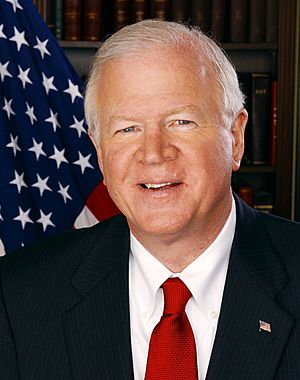Saxby Chambliss facts for kids
Quick facts for kids
Saxby Chambliss
|
|
|---|---|
 |
|
| United States Senator from Georgia |
|
| In office January 3, 2003 – January 3, 2015 |
|
| Preceded by | Max Cleland |
| Succeeded by | David Perdue |
| Chair of the Senate Agriculture Committee | |
| In office January 3, 2005 – January 3, 2007 |
|
| Preceded by | Thad Cochran |
| Succeeded by | Tom Harkin |
| Member of the U.S. House of Representatives from Georgia's 8th district |
|
| In office January 3, 1995 – January 3, 2003 |
|
| Preceded by | Roy Rowland |
| Succeeded by | Jim Marshall (Redistricting) |
| Personal details | |
| Born |
Clarence Saxby Chambliss
November 10, 1943 Warrenton, North Carolina, U.S. |
| Political party | Republican |
| Spouse |
Julianne Frohbert
(m. 1966) |
| Children | 2 |
| Education | University of Georgia (BBA) University of Tennessee, Knoxville (JD) |
Clarence Saxby Chambliss (born November 10, 1943) is an American lawyer and retired politician. He served as a United States Senator for the state of Georgia from 2003 to 2015. As a member of the Republican Party, he was also a U.S. Representative from 1995 to 2003.
In the House of Representatives, Chambliss was the chairman of a group that looked into the work of U.S. intelligence agencies after the September 11 attacks in 2001.
Later, as a senator, he was in charge of the Senate Committee on Agriculture, Nutrition and Forestry. He also became the top Republican on the Senate Select Committee on Intelligence. In 2011, The Washington Post newspaper named him one of the "Best Leaders" for his work with both Democrats and Republicans to solve national problems.
Chambliss was re-elected to the Senate in 2008 but decided not to run for another term in 2014.
Contents
Early Life and Schooling
Saxby Chambliss was born in Warrenton, North Carolina. His father was an Episcopal priest. He grew up in Shreveport, Louisiana, and graduated from C.E. Byrd High School in 1961.
He went to college at Louisiana Tech University and then the University of Georgia, where he earned a degree in business in 1966. To help pay for college, he worked at a bakery. After that, he went to the University of Tennessee College of Law and graduated with a law degree in 1968.
During the Vietnam War, Chambliss was not drafted into the military. He had student deferments, which allowed him to stay in school. He also had a medical deferment for a knee injury from playing football.
Career in the U.S. House of Representatives
In 1994, Chambliss was elected to the U.S. House of Representatives. He was part of a large group of new conservative Republicans who helped their party win control of Congress that year. This event was known as the Republican Revolution.
He represented Georgia's 8th district, which had never elected a Republican before. He won his first election with 63% of the vote. He was re-elected three more times in 1996, 1998, and 2000.
During his time in the House, Chambliss was on the Intelligence Committee. He was the chairman of the Subcommittee on Terrorism and Homeland Security. After the September 11, 2001, attacks, his subcommittee investigated what the U.S. intelligence agencies knew before the attacks. Their report pointed out problems that needed to be fixed.
In November 2001, Chambliss made a comment about homeland security that caused controversy. He later apologized for his remarks.
Serving in the U.S. Senate
How He Was Elected
The 2002 Election

In 2002, Chambliss decided to run for the U.S. Senate. He ran against the current senator, Max Cleland, a Democrat.
During the campaign, Chambliss ran a TV ad that criticized Cleland's record on national security. Many people, including other Republicans, felt the ad was unfair because Cleland was a decorated Vietnam War veteran who had been seriously injured in the war. The ad was eventually taken down.
Chambliss won the election with 53% of the vote.
The 2008 Election
In 2008, Chambliss ran for re-election. In the first vote, he got 49.8% of the vote, which was just under the 50% needed to win. This meant he had to face the Democratic challenger, Jim Martin, in a special runoff election.
In the runoff, Chambliss won with 57% of the vote and was elected to a second term in the Senate.
His Work as a Senator
Chambliss was known for having a conservative voting record. However, he often worked with Democrats on important laws. This is called being bipartisan.
Some of his bipartisan work included:
- The 2007 Farm Bill, which dealt with farming and food programs.
- An immigration reform bill in 2007.
- The Emergency Economic Stabilization Act of 2008, which was created to help the U.S. economy during a financial crisis.
He was also a leader of the "Gang of 10," a bipartisan group of senators who tried to create a new energy policy for the country. Because of his work to bring both parties together, The Washington Post recognized him as a top leader in 2011.
In 2013, Chambliss was one of 46 senators who voted against a bill that would have required background checks for all gun purchases. The bill did not pass.
Chambliss decided not to run for re-election in 2014. After he retired from the Senate in 2015, he joined a law firm as a partner.
Committees He Served On
In the Senate, members work in small groups called committees to focus on specific topics. Chambliss served on several important committees, including:
- Senate Select Committee on Intelligence (where he was Vice Chairman)
- Senate Armed Services Committee
- Senate Committee on Agriculture, Nutrition, and Forestry
- Senate Committee on Rules and Administration
- Senate Special Committee on Aging
Personal Life
Chambliss is a member of St. Mark's Anglican Church in Moultrie, Georgia. He married his wife, Julianne Frohbert, in 1966. They have two children and six grandchildren.
In December 2020, Chambliss had a minor stroke.
 | Calvin Brent |
 | Walter T. Bailey |
 | Martha Cassell Thompson |
 | Alberta Jeannette Cassell |

